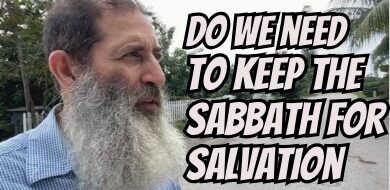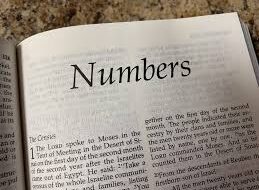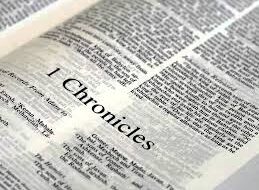Tag Archives: torah
Do We Need To Keep The Sabbath For Salvation?
Do We Need To Keep The Sabbath For Salvation?
Genesis 16 & 17 Every Child Is A Blessing
Genesis 16 & 17 Every Child Is A Blessing
Modesty Guidelines for Fellowship
What is the standard for modesty in your fellowship? How about your house?
1 Chronicles 2 Daily Bible Reading with Paul Nison
1 Chronicles 2 New Living Translation (NLT)
Descendants of Israel
2 The sons of Israel[a] were Reuben, Simeon, Levi, Judah, Issachar, Zebulun, 2 Dan, Joseph, Benjamin, Naphtali, Gad, and Asher.
Descendants of Judah
3 Judah had three sons from Bathshua, a Canaanite woman. Their names were Er, Onan, and Shelah. But the Lord saw that the oldest son, Er, was a wicked man, so he killed him. 4 Later Judah had twin sons from Tamar, his widowed daughter-in-law. Their names were Perez and Zerah. So Judah had five sons in all.
5 The sons of Perez were Hezron and Hamul.
6 The sons of Zerah were Zimri, Ethan, Heman, Calcol, and Darda[b]—five in all.
7 The son of Carmi (a descendant of Zimri) was Achan,[c] who brought disaster on Israel by taking plunder that had been set apart for the Lord.[d]
8 The son of Ethan was Azariah.
From Judah’s Grandson Hezron to David
9 The sons of Hezron were Jerahmeel, Ram, and Caleb.[e]
10 Ram was the father of Amminadab.
Amminadab was the father of Nahshon, a leader of Judah.
11 Nahshon was the father of Salmon.[f]
Salmon was the father of Boaz.
12 Boaz was the father of Obed.
Obed was the father of Jesse.
13 Jesse’s first son was Eliab, his second was Abinadab, his third was Shimea, 14 his fourth was Nethanel, his fifth was Raddai, 15 his sixth was Ozem, and his seventh was David.
16 Their sisters were named Zeruiah and Abigail. Zeruiah had three sons named Abishai, Joab, and Asahel. 17 Abigail married a man named Jether, an Ishmaelite, and they had a son named Amasa.
Other Descendants of Hezron
18 Hezron’s son Caleb had sons from his wife Azubah and from Jerioth.[g] Her sons were named Jesher, Shobab, and Ardon. 19 After Azubah died, Caleb married Ephrathah,[h] and they had a son named Hur. 20 Hur was the father of Uri. Uri was the father of Bezalel.
21 When Hezron was sixty years old, he married Gilead’s sister, the daughter of Makir. They had a son named Segub. 22 Segub was the father of Jair, who ruled twenty-three towns in the land of Gilead. 23 (But Geshur and Aram captured the Towns of Jair[i] and also took Kenath and its sixty surrounding villages.) All these were descendants of Makir, the father of Gilead.
24 Soon after Hezron died in the town of Caleb-ephrathah, his wife Abijah gave birth to a son named Ashhur (the father of[j] Tekoa).
Descendants of Hezron’s Son Jerahmeel
25 The sons of Jerahmeel, the oldest son of Hezron, were Ram (the firstborn), Bunah, Oren, Ozem, and Ahijah. 26 Jerahmeel had a second wife named Atarah. She was the mother of Onam.
27 The sons of Ram, the oldest son of Jerahmeel, were Maaz, Jamin, and Eker.
28 The sons of Onam were Shammai and Jada.
The sons of Shammai were Nadab and Abishur.
29 The sons of Abishur and his wife Abihail were Ahban and Molid.
30 The sons of Nadab were Seled and Appaim. Seled died without children, 31 but Appaim had a son named Ishi. The son of Ishi was Sheshan. Sheshan had a descendant named Ahlai.
32 The sons of Jada, Shammai’s brother, were Jether and Jonathan. Jether died without children, 33 but Jonathan had two sons named Peleth and Zaza.
These were all descendants of Jerahmeel.
34 Sheshan had no sons, though he did have daughters. He also had an Egyptian servant named Jarha. 35 Sheshan gave one of his daughters to be the wife of Jarha, and they had a son named Attai.
36 Attai was the father of Nathan.
Nathan was the father of Zabad.
37 Zabad was the father of Ephlal.
Ephlal was the father of Obed.
38 Obed was the father of Jehu.
Jehu was the father of Azariah.
39 Azariah was the father of Helez.
Helez was the father of Eleasah.
40 Eleasah was the father of Sismai.
Sismai was the father of Shallum.
41 Shallum was the father of Jekamiah.
Jekamiah was the father of Elishama.
Descendants of Hezron’s Son Caleb
42 The descendants of Caleb, the brother of Jerahmeel, included Mesha (the firstborn), who became the father of Ziph. Caleb’s descendants also included the sons of Mareshah, the father of Hebron.[k]
43 The sons of Hebron were Korah, Tappuah, Rekem, and Shema. 44 Shema was the father of Raham. Raham was the father of Jorkeam. Rekem was the father of Shammai. 45 The son of Shammai was Maon. Maon was the father of Beth-zur.
46 Caleb’s concubine Ephah gave birth to Haran, Moza, and Gazez. Haran was the father of Gazez.
47 The sons of Jahdai were Regem, Jotham, Geshan, Pelet, Ephah, and Shaaph.
48 Another of Caleb’s concubines, Maacah, gave birth to Sheber and Tirhanah. 49 She also gave birth to Shaaph (the father of Madmannah) and Sheva (the father of Macbenah and Gibea). Caleb also had a daughter named Acsah.
50 These were all descendants of Caleb.
Descendants of Caleb’s Son Hur
The sons of Hur, the oldest son of Caleb’s wife Ephrathah, were Shobal (the founder of Kiriath-jearim), 51 Salma (the founder of Bethlehem), and Hareph (the founder of Beth-gader).
52 The descendants of Shobal (the founder of Kiriath-jearim) were Haroeh, half the Manahathites, 53 and the families of Kiriath-jearim—the Ithrites, Puthites, Shumathites, and Mishraites, from whom came the people of Zorah and Eshtaol.
54 The descendants of Salma were the people of Bethlehem, the Netophathites, Atroth-beth-joab, the other half of the Manahathites, the Zorites, 55 and the families of scribes living at Jabez—the Tirathites, Shimeathites, and Sucathites. All these were Kenites who descended from Hammath, the father of the family of Recab.[l]
Footnotes:
- 2:1 Israel is the name that God gave to Jacob.
- 2:6 As in many Hebrew manuscripts, some Greek manuscripts, and Syriac version (see also 1 Kgs 4:31); Hebrew reads Dara.
- 2:7a Hebrew Achar; compare Josh 7:1. Achar means “disaster.”
- 2:7b The Hebrew term used here refers to the complete consecration of things or people to the Lord, either by destroying them or by giving them as an offering.
- 2:9 Hebrew Kelubai, a variant spelling of Caleb; compare 2:18.
- 2:11 As in Greek version (see also Ruth 4:20); Hebrew reads Salma.
- 2:18 Or Caleb had a daughter named Jerioth from his wife, Azubah. The meaning of the Hebrew is uncertain.
- 2:19 Hebrew Ephrath, a variant spelling of Ephrathah; compare 2:50 and 4:4.
- 2:23 Or captured Havvoth-jair.
- 2:24 Or the founder of; also in 2:42, 45, 49.
- 2:42 Or who founded Hebron. The meaning of the Hebrew is uncertain.
- 2:55 Or the founder of Beth-recab.
Secure Your Relationship
Apple of Whose Eye
Apple of Whose Eye
(#048 from Suffer Well Devotional Series©)
www.sufferwell.org
But Yahweh said to Samuel, “Do not consider his appearance or his height, for I have rejected him. Yahweh does not look at the things people look at. People look at the outward appearance, but Yahweh looks at the heart [center of intellect].” (1 Samuel 16:7)
Shaul (Paul) taught that we must take every thought captive and make it obedient unto the Messiah (2 Corinthians 10:5). He was revealing the Messianic allusion of the words of the great prophet. He says, “You judge by appearances;” (v. 7) you are looking at the outside, the physical, but it is the mind that truly matters (v. 5). Yes, the mind, and the command to take every thought captive, is magnificently congruous with the prophet’s Hebrew understanding of the heart, the center of intellect. People look at the outward appearance, but Yahweh looks at the heart! Yahweh is looking for the mind of the Messiah in you. Oh yes loved one, [His] ways are higher than your ways and [His] thoughts [higher] than your thoughts. (Isaiah 55:9)
King David was a man after Yahweh’s heart; “the apple of His eye” (Psalm 17:8). Who was David? He was a murderer, an adulterer! Let there be no doubt; there are many “Davids” in the church today, who are lost in their iniquity, and yet who are madly devoted to the things of the Father. The church itself would deem these modern-day “Davids” as sinners, guilty, unclean, and even not fit for salvation. And they would accuse those sinners in their hearts, while at the same time singing praises to the “Lord” at weekly services, using words from the very Psalms written by David, the murder and adulterer.
The truth about David’s courage and lineage is preached, which of course leads to the Messiah. But, the preaching commences with fervor as does the condemnation of these modern-day Davids. And all of this is shielded under the umbrella of self-proclaimed righteousness. This disconnect is not because so much time has passed since King David walked the earth, as if time would heal the constructs of the ego. Time does not change the heart of man. All have sinned and fall short of the glory of the Almighty. (Romans 3:23)
This disconnect is due to the denial that the brand of “church” or practice of “Christianity” they preach does not coincide with the true intent of their thoughts, the wickedness in their hearts. Unforgiveness and condemnation is the manifest evidence. We love to acknowledge the Messiah’s greatness as He “forgives us even though we do not know what we are doing. (Luke 23:34).” And yet, it is a rarity indeed to witness a modern-day believer lay down his life for another, especially one who is “unworthy.”
Yahweh is looking for those who realize that if He only used “good” people to do His work on the earth, then there would be no one to use. Stop wrongly judging your living brother by appearances, while at the same time glorifying the dead heroes of the faith who were just like them. This, indeed, is a reality check for us all!
We Don’t Trust God. We need to Follow Him!
We Don’t Trust You
(#017 from Suffer Well Devotional Series©)
www.sufferwell.org
Every thought, every desire, and every action that does not conform to the will of the Father can be sized up in one simple statement. “I don’t trust you Yahweh.” “How can that be,” you ask? It really is so simple that a child will understand. Whenever you decide to go your own way, a way other than the Creator’s, you are saying that your way is better than His. It sets a very dangerous precedent and makes the undeniable statement that you ultimately don’t prefer His will over your own. Sin is always the verdict when this mindset prevails; it is a mindset that proves your lack of trust in Him.
For I know the plans I have for you,” declares Yahweh, “plans to prosper you and not to harm you, plans to give you hope and a future. (Jeremiah 29:11) If you could go forward in time and see what the Father has planned for you, certainly you would not choose your own path. You would not attempt to alter His plan. Every sin does just that. It alters or delays the speedy and bountiful result that He has planned for you. Yes, for followers of Yahshua the Messiah there is mercy and grace. However, you can choose the forty year journey or take the direct route and arrive in eleven days.
Repent! Realize that anything other than complete trust in the will of the Father alone is a sinful lack of faith. Sin always extends your journey and delays your arrival to the destination you so desire. Take time to seek His face (Matthew 6:33) and He will always reveal His perfect plan for your life. Yes, you may have to set out on your journey by faith, not knowing exactly how to get to your destination. However, your obedience to take the first step will be rewarded.
He is not like a man that He should lie to you (Numbers 23:19). His hope and future is what you were created for. The ability to reach your dreams in life is only limited by your recognition that Yahweh put them in your heart (center of intellect) in the first place, and your lacking faith that He will fulfill them. Delight yourself also in Yahweh, and He shall give you the desires of your heart. (Psalm 37:4) Delight yourself; Yes, it means to be soft or delicate toward, or in other words, to possess a soft heart toward Yahweh. He placed those desires in there and when your heart is soft (delights in Him), then He fulfills them. This is His plan; it cannot change. Only your heart can.
I will give you a new heart and put a new spirit in you; I will remove from you your heart of stone and give you a heart of flesh. (Ezekiel 36:26)
Forget the former things. Stop Dwelling.
Dwelling
(#007 from Suffer Well Devotional Series©)
www.Sufferwell.org
Forget the former things; do not dwell on the past. Behold, I am doing a new thing! Now it springs up; do you not perceive it? I Am making a way in the wilderness and streams in the wasteland. (Isaiah 43:18-19)
He opens up new paths in the wilderness; even in a desolate place you will find streams of living water. This is because; even in His chastisement He is tender. He does not destroy His children (Psalm 78:38).
Yahweh was well aware of the things that would bind you. Look carefully lest you fall short of the grace of the Mighty One; lest any root of bitterness springing up in you and cause trouble, and by this even many others become defiled. (Hebrews 12:15) Forget the former things; do not dwell on the past. It only causes trouble. Dwelling on the past forms shackles that bind you; looking back nourishes roots that will grow the fruit of guilt, shame, unworthiness, greed, pride, and arrogance; anything but streams of living water.
“Behold, I Am doing a new thing!” says Yahweh. Not believing Me is what waters the bitter root. May I encounter you? May I take away the shackles in your mind? May I give you the mind of the Messiah (1 Corinthians 2:16)? Put aside emotion and listen to My voice. If I tell you I Am doing something new, I Am. I use all of your pain, all of your mistakes, and all of your disobedience to advance My Kingdom. If I wished not to use those fleshly things, I would have made you a spirit being entirely, like My mighty malachim (angels). Instead, I left you in the flesh so you would learn to fight for spiritual territory; My Kingdom suffers violence and violent men take it by force (Matthew11:12). It is My plan that you battle for righteousness.
Forget the former things; My mercies are new every day. (Lamentations 3:23) Even now, as you dwell on painful memories, release them into My care. My Son’s shed blood covers them all. I don’t mind your regret; reverent sorrow brings repentance (2 Corinthians 7:10). But go no further than that; the rest is up to Me! Behold, I Am doing a new thing! Do you not perceive it?










